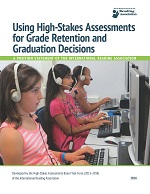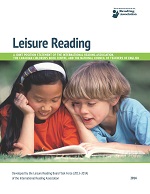The International Reading Association (IRA) released two statements recently to update the organization’s positions on vital literacy issues—the
use of high-stakes assessments for high school graduation and grade retention decisions and the
benefits of leisure reading for students.
 The position statement on high stakes assessment expresses concern about the "overemphasis" on these assessments for both student and teacher evaluation, and Dr. Jill Lewis-Spector, IRA President and task force chair, notes this has led to a considerable amount of test prep rather than student learning.
The position statement on high stakes assessment expresses concern about the "overemphasis" on these assessments for both student and teacher evaluation, and Dr. Jill Lewis-Spector, IRA President and task force chair, notes this has led to a considerable amount of test prep rather than student learning.
“Further, effective classroom teachers know the unique needs of each student,” she said. “When they have the freedom to address these through authentic and engaging experiences building upon each student’s talents and developing students’ multiple literacies, the learning is deeper and more meaningful.”
The impact of grade retention and withholding diplomas from high school students has been short-term gains, at best, but the Rand Corporation’s 2009 review of studies showed virtually no evidence of academic improvement, said Lewis-Spector, professor emerita of literacy education at New Jersey City University. In the case of high school students, withholding graduation seems to increase the likelihood that student will drop out of school completely, to say nothing of the stress and helpless feelings students experience when facing “failure.”
It is the position of IRA that a number of measures, including informal observations, formative assessments of schoolwork and consideration of out-of literacies should be factored into decisions, in addition to standardized formal measures. Teachers, students and their families should also have input before retention or graduation decisions are made.
To shape future discussion of assessments, IRA recommends professional development of assessment strategies for teachers and an open dialog between administrators and professional literacy groups, including IRA.
“Our members are knowledgeable about literacy instruction, well-versed in related research, and contribute to our knowledge base through their research and writing,” Lewis-Spector said. “We encourage school administrators and other school leaders who may not be as knowledgeable about literacy development and instruction to be guided by IRA’s publications as well as the research our members have done and the positions our organization takes on topics of such importance as this one.”
 In a separate position statement, IRA encouraged the use of “leisure reading” whenever possible for students. The freedom of choice in books stimulates comprehension, vocabulary, general knowledge, and a lifelong motivation to read.
In a separate position statement, IRA encouraged the use of “leisure reading” whenever possible for students. The freedom of choice in books stimulates comprehension, vocabulary, general knowledge, and a lifelong motivation to read.
“When there is choice, students are more likely to read books that interest them, and thus, feel a sense of commitment to reading them,” said IRA Board member Shelley Stagg Peterson, corresponding author of the statement. “In my experience, it is difficult to find one book that is of interest to a group of 25 individuals, whether they are children, young adults or adults.”
Offering different book selections in one classroom is a benefit, not only in student exposure to a wide variety of material, but also for the student who will summarize a book for classmates. New ideas and emotional responses will be shared, said Stagg Peterson, a professor of literacy at the University of Toronto.
“Children can explore ideas by talking with others,” she said. “There might be something that doesn’t quite fit with their views of the world and they need to mull over the ideas and get input from others to make sense of it.
“The pleasure that they experience is deepened when others show excitement or other strong emotional responses to the books.”
Technology can facilitate discussion outside of the classroom via chat groups. E-readers also allow students to take notes on the books and consult annotated lists and glossaries for the books.
For the leisure reading statement, IRA partnered with the Canadian Children’s Book Centre (CCBC) and the National Council of Teachers of English (NCTE).
April Hall is editor of Reading Today Online. You can reach her through e-mail (ahall@/) or Twitter (@mediaapril).